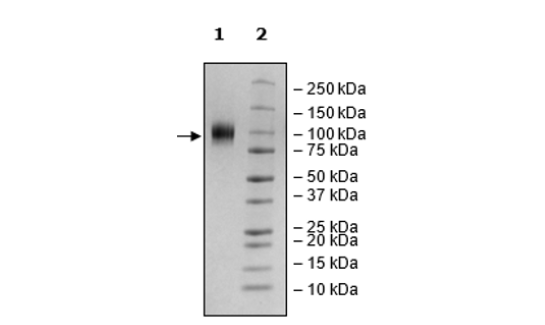CD4, Fc Fusion, Avi-Tag, Biotin-Labeled Recombinant
Recombinant human CD4, encompassing amino acids 26-396, corresponding to the extracellular domain. This construct includes an Fc-domain from IgG1 fused at the C-terminus, followed by an Avi-tag™. This protein was affinity purified.
≥90%
Aqueous buffer solution.
8 mM phosphate, pH 7.4, 110 mM NaCl, 2.2 mM KCl, and 20% glycerol
This protein is enzymatically biotinylated using Avi-Tag™ technology. Biotinylation is confirmed to be ≥90%.
For more information on enzymatic biotinylation, please see our Tech Note.
CD4 is a cell surface glycoprotein found on partially defined functional T cell subsets, including helper T cells and T-regulatory cells, peripheral monocytes and other APCs (antigen-presenting cells). The ectodomain of CD4 binds to membrane-proximal domains of MHC (major histocompatibility complex) class II molecules, while its cytoplasmic domains interact with the protein tyrosine kinase p56lck (lck) through a shared cysteine-containing motif. CD4+ T cells, or helper T cells, are a type of lymphocyte that helps coordinate the immune response against infection and disease by activating cells of the innate immune system, B-lymphocytes and cytotoxic T cells. CD4+ T cells are activated by interaction between the TCR (T- cell receptor) and its cognate peptide presented on MHC II molecules, and CD4 is a critical component of the T cell receptor complex that recognizes antigenic peptides presented by MHC II molecules, increasing its stability. CD4 is typically used as a T cell marker that allows to characterize the populations of T cells present in a sample.



